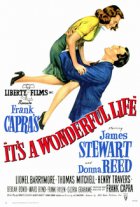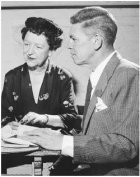
It's a Wonderful Life Page #2
- PG
- Year:
- 1946
- 130 min
- 2,444 Views
VIOLET (with warm friendliness)
Hello, George.
(then, flatly, as she sees Mary)
VIOLET:
'Lo, Mary.
MARY (primly)
Hello, Violet.
George regards the two of them with manly disgust. They are two
kids to him, and a nuisance. He starts over for the candy
counter.
GEORGE:
Two cents worth of shoelaces?
VIOLET:
She was here first.
MARY:
I'm still thinking.
GEORGE (to Violet)
Shoelaces?
VIOLET:
Please, Georgie.
George goes over to the candy counter.
VIOLET (to Mary)
I like him.
MARY:
You like every boy.
VIOLET (happily)
What's wrong with that?
GEORGE:
Here you are.
George gives Violet a paper sack containing licorice shoelaces.
Violet gives him the money.
VIOLET (the vamp)
Help me down?
GEORGE (disgusted)
Help you down!
Violet jumps down off her stool and exits. Mary, watching, sticks
out her tongue as she passes.
CLOSE SHOT �� George and Mary at fountain.
GEORGE:
Made up your mind yet?
MARY:
I'll take chocolate.
George puts some chocolate ice cream in a dish.
GEORGE:
With coconuts?
MARY:
I don't like coconuts.
GEORGE:
You don't like coconuts! Say, brainless, don't you know where
coconuts come from? Lookit here �� from Tahiti �� Fiji Islands,
the Coral Sea!
He pulls a magazine from his pocket and shows it to her.
MARY:
A new magazine! I never saw it before.
GEORGE:
Of course you never. Only us explorers can get it. I've been
nominated for membership in the National Geographic Society.
He leans down to finish scooping out the ice cream, his deaf ear
toward her. She leans over, speaking softly.
CLOSE SHOT �� Mary, whispering.
MARY:
Is this the ear you can't hear on? George Bailey, I'll love you
till the day I die.
She draws back quickly and looks down, terrified at what she has
said.
CLOSE SHOT �� George and Mary.
GEORGE:
I'm going out exploring some day, you watch. And I'm going to
have a couple of harems, and maybe three or four wives. Wait and
see.
He turns back to the cash register, whistling.
ANOTHER ANGLE �� taking in entrance to prescription room at end
of fountain. Gower comes to the entrance. He is bleary-eyed,
unshaven, chewing
an old unlit cigar. His manner is gruff and mean. It is evident
he has been drinking.
GOWER:
George! George!
GEORGE:
Yes, sir.
GOWER:
You're not paid to be a canary.
GEORGE:
No, sir.
He turns back to the cash register when he notices an open
telegram on the shelf. He is about to toss it aside when he
starts to read it.
INSERT:
THE TELEGRAM. It reads:
"We regret to inform you that your son, Robert, died very
suddenly this morning of influenza stop. Everything possible was
done for his comfort stop. We await
instructions from you."
Pres. HAMMERTON COLLEGE."
BACK TO SHOT. George puts the telegram down. A goodness of heart
expresses itself in a desire to do something for Gower. He gives
the ice cream to
Mary without comment and sidles back toward Gower.
INTERIOR PRESCRIPTION ROOM OF DRUGSTORE �� DAY
CLOSE SHOT �� Gower, drunk, is intent on putting some capsules
into a box.
GEORGE:
Mr. Gower, do you want something . . . Anything?
GOWER:
No.
GEORGE:
Anything I can do back here?
GOWER:
No.
George looks curiously at Gower, realizing that he is quite
drunk. Gower fumbles and drops some of the capsules to the floor.
CLOSE SHOT �� capsules spilling on floor at their feet.
BACK TO SHOT �� George and Gower.
GEORGE:
I'll get them, sir.
He picks up the capsules and puts them in the box. Gower waves
George aside, takes his old wet cigar, shoves it in his mouth and
sits in an old Morris
chair in the background. George turns a bottle around from which
Gower has taken the powder for the capsules. Its label reads
"POISON." George
stands still, horrified.
GOWER:
Take these capsules over to Mrs. Blaine's. She's waiting for
them.
George picks up the capsule box, not knowing what to do or say.
His eyes go, harassed, to the bottle labeled poison. George's
fingers fumble.
GEORGE:
Yes, sir. They have the diphtheria there, haven't they, sir?
GOWER:
Ummmm . . .
Gower stares moodily ahead, sucking his cigar. George turns to
him, the box in his hand.
GEORGE:
Is it a charge, sir?
GOWER:
Yes �� charge.
GEORGE:
Mr. Gower, I think . . .
GOWER:
Aw, get going!
GEORGE:
Yes, sir.
INTERIOR DRUGSTORE �� DAY
MEDIUM SHOT �� George comes out into main room. As he puts on his
cap he sees a Sweet Caporals ad which says:
INSERT:
"ASK DAD HE KNOWS" �� SWEET CAPORAL
BACK TO SHOT:
With an inspiration, George dashes out the door and down the
street. Mary follows him with her eyes.
George visits Pop's office
EXTERIOR STREET �� DAY
MEDIUM SHOT �� George runs down the street until he comes
opposite a two-story building with a sign on it reading
"Bailey Building and Loan
Association." He stops. Potter's carriage is waiting at the
entrance. Suddenly he runs up the stairs.
INTERIOR OUTER OFFICE BLDG. AND LOAN �� DAY
FULL SHOT �� The offices are ancient and a bit on the rickety
side. There is a counter with a grill, something like a bank.
Before a door marked:
PETER BAILEY, PRIVATE, George's Uncle Billy stands, obviously
trying to hear what is going on inside. He is a very good-humored
man of about fifty,
in shirt-sleeves. With him at the door, also listening, are
Cousin Tilly Bailey, a waspish-looking woman, who is the
telephone operator, and Cousin
Eustace Bailey, the clerk. The office vibrates with an aura of
crisis as George enters and proceeds directly toward his father's
office.
CLOSE SHOT �� Uncle Billy listening at the door. As George is
about to enter his father's office, uncle Billy grabs him by the
arm.
UNCLE BILLY:
Avast, there, Captain Cook! Where you headin'?
GEORGE:
Got to see Pop, Uncle Billy.
UNCLE BILLY:
Some other time, George.
GEORGE:
It's important.
UNCLE BILLY:
There's a squall in there that's shapin' up into a storm.
During the foregoing, Cousin Tilly has answered the telephone,
and now she calls out:
COUSIN TILLY:
Uncle Billy . . . telephone.
UNCLE BILLY:
Who is it?
COUSIN TILLY:
Bank examiner.
INSERT:
CLOSE UP Uncle Billy's left hand. There are pieces of string tied
around two of the fingers, obviously to remind him of things he
has to do.
BACK TO SHOT �� Uncle Billy looking at his hand.
UNCLE BILLY:
Bank examiner! I should have called him yesterday. Switch it
inside.
He enters a door marked
WILLIAM BAILEY, PRIVATE. George stands irresolute a moment, aware
of crisis in the affairs of the Bailey Building and Loan
Association, but aware more keenly of his personal crisis. He
opens the door of his father's office and enters.
INTERIOR BAILEY'S PRIVATE OFFICE �� DAY
MEDIUM SHOT �� George's father is seated behind his desk,
nervously drawing swirls on a pad. He looks tired and worried. He
is a gentle man in his
forties, an idealist, stubborn only for other people's rights.
Nearby, in a throne-like wheelchair, behind which stands the goon
who furnishes the motive
power, sits Henry F. Potter, his squarish derby hat on his head.
The following dialogue is fast and heated, as though the argument
had been in process for
some time.
Translation
Translate and read this script in other languages:
Select another language:
- - Select -
- 简体中文 (Chinese - Simplified)
- 繁體中文 (Chinese - Traditional)
- Español (Spanish)
- Esperanto (Esperanto)
- 日本語 (Japanese)
- Português (Portuguese)
- Deutsch (German)
- العربية (Arabic)
- Français (French)
- Русский (Russian)
- ಕನ್ನಡ (Kannada)
- 한국어 (Korean)
- עברית (Hebrew)
- Gaeilge (Irish)
- Українська (Ukrainian)
- اردو (Urdu)
- Magyar (Hungarian)
- मानक हिन्दी (Hindi)
- Indonesia (Indonesian)
- Italiano (Italian)
- தமிழ் (Tamil)
- Türkçe (Turkish)
- తెలుగు (Telugu)
- ภาษาไทย (Thai)
- Tiếng Việt (Vietnamese)
- Čeština (Czech)
- Polski (Polish)
- Bahasa Indonesia (Indonesian)
- Românește (Romanian)
- Nederlands (Dutch)
- Ελληνικά (Greek)
- Latinum (Latin)
- Svenska (Swedish)
- Dansk (Danish)
- Suomi (Finnish)
- فارسی (Persian)
- ייִדיש (Yiddish)
- հայերեն (Armenian)
- Norsk (Norwegian)
- English (English)
Citation
Use the citation below to add this screenplay to your bibliography:
Style:MLAChicagoAPA
"It's a Wonderful Life" Scripts.com. STANDS4 LLC, 2025. Web. 21 Feb. 2025. <https://www.scripts.com/script/it's_a_wonderful_life_872>.







Discuss this script with the community:
Report Comment
We're doing our best to make sure our content is useful, accurate and safe.
If by any chance you spot an inappropriate comment while navigating through our website please use this form to let us know, and we'll take care of it shortly.
Attachment
You need to be logged in to favorite.
Log In